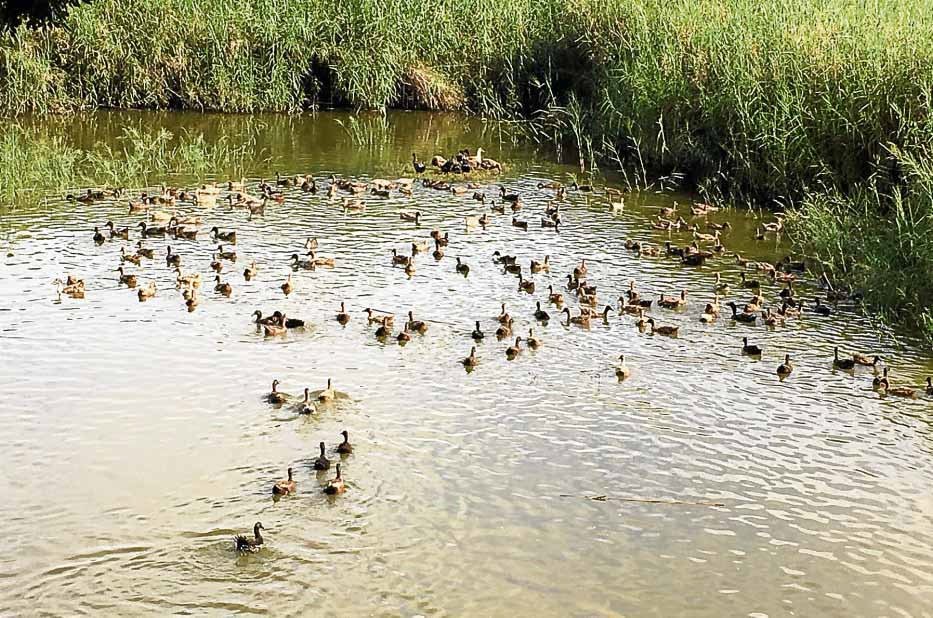Popular Reads
Top Results
Can't find what you're looking for?
View all search resultsPopular Reads
Top Results
Can't find what you're looking for?
View all search resultsPhilippine duck raisers bear brunt of bird flu
Avian flu outbreak hits ducks in Benedicta Baylon despite the Philippine government's effort to quarantine the fowls within the seven-kilometer radius where the bird flu outbreak started.
Change text size
Gift Premium Articles
to Anyone
A
s the Philippine government tries to quarantine the fowls within the seven-kilometer radius where the bird flu outbreak started to prevent the spread of the virus, even duck raisers are affected.
The 1.7 million ducks fattened up by Benedicta Baylon and 126 other raisers in Barangay (village) Bahay Pari here produce an average of one million eggs daily.
But since Saturday, a day after Agriculture Secretary Manny Piñol announced an outbreak of avian flu in San Luis town, buyers have canceled orders for outlets in Metro Manila, the Visayas and Mindanao, Baylon said.
On Sunday, Gov. Lilia Pineda asked Piñol to lift the quarantine imposed within a 7-kilometer control area of the infected town.
“We lost our buyers, there are no more orders,” said Baylon, chair of Candaba Duck Raisers and Farmers Multipurpose Cooperative.
The quarantine has resulted in a glut of 2 million eggs. At the farm gate price of P7 each, the losses amount to P14 million (US$273,000), excluding the cost of buying live ducks at P250 each as well as feeds.
Baylon, 50, said that in her 20 years in the business, this was the only time she had incurred zero sales.
“We should not be suffering,” she said.
Barangay Bahay Pari is 12 km from San Luis. The Bureau of Animal Industry (BAI) tested farms in the barangay and concluded it was not infected.
At stake is a P1-billion industry employing more than 100 workers, Baylon said.
Like her, several duck raisers try to reduce losses by converting their produce into salted eggs.
Candaba Mayor Danilo Baylon said quarantine checkpoints stopped the raisers from transporting their produce as a result of an Aug. 11 BAI memorandum that imposed a temporary ban on the movement of live domestic and wild birds and their products, including poultry meat, day-old chicks, eggs and manure from Luzon to the Visayas and Mindanao.
In Minalin, considered the egg capital of Luzon, Mayor Edgar Flores said traders had become apprehensive because of low sales.
He said there should be “no real or imagined scare because Minalin is outside the 7-km control area.”
“Our layers [egg-laying chickens], broilers [fresh chickens grown in 45 days] and ducks grown in backyards have shown no symptoms of bird flu,” he said.
He urged the Department of Agriculture and the Department of Health to declare the produce in Minalin to be “safe for consumption.”
Minalin has one million layers and 50,000 broilers.
On the strength of a state of calamity declared by the provincial legislative board, Pineda ordered veterinarians, sanitary engineers and mayors to inspect poultry farms and determine their compliance with proper hygiene and waste disposal practices.
She also asked local councils to pass ordinances authorizing mayors to revoke the business permits of owners who did not report incidents of animal diseases and violated environmental standards.
In San Luis, men in Barangay San Carlos refused to help BAI teams destroy chickens, quails and ducks infected or exposed to avian flu, although a day’s job would earn them P500 from the local government.
On Sunday, culling of chickens proceeded at full blast on eight farms.
After the culling of 131,500 chickens, quails and ducks on 13 farms, the 1-km danger zone will remain under a state of quarantine for three months.
This article appeared on the Philippine Daily Inquirer newspaper website, which is a member of Asia News Network and a media partner of The Jakarta Post







